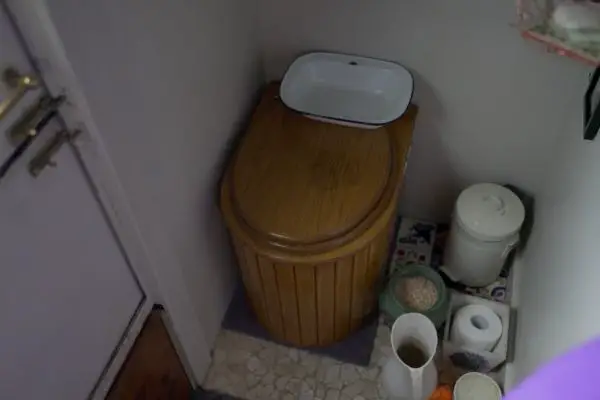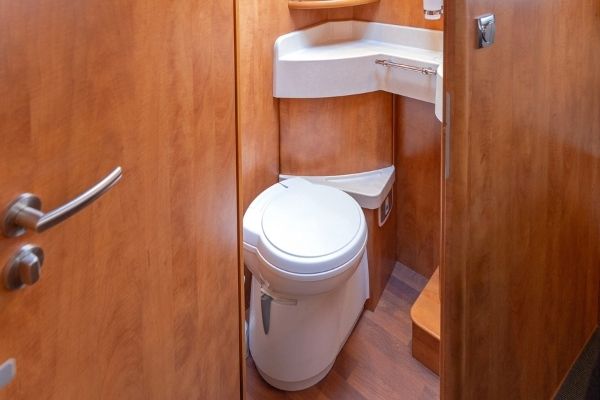Composting Toilets for Your Home, Cabin, or Tiny House – Our Top 8 Picks for 2024
Spending weekends at the cabin or downsizing to a tiny house sounds great, right? Until — that is — you think about all of the modern conveniences you’ll need to sacrifice in the meantime.

Here’s some good news: A clean, functioning toilet is not one of those sacrifices!
Composting toilets are easily one of the most sustainable solutions for household bathroom waste. They don’t need any water or outgoing plumbing to work. And many can run with little or no electricity.
The Nature’s Head Composting Toilet is a great all-around option for anyone looking to add one of these fixtures to their home, cabin, or tiny house. While this self-contained model is straightforward and appropriate for most applications, it’s only a small sample of what’s available!
Composting Toilets for Your Home, Cabin, or Tiny House
Best Overall — Nature’s Head Composting Toilet

Composting toilets might be a relatively new innovation. But there are still some recognizable names leading the way. The Nature’s Head Composting Toilet is one of the top models available on the market that many eco-consumers will have seen before.
This self-contained composting toilet is relatively straightforward and easy to understand. Its appearance is very similar to a regular flushing toilet, which is a plus for anyone interested in designing a sustainable bathroom that still looks “normal.”
The Nature’s Head Composting Toilet must be permanently mounted and does include a 12V plug (compatible with 110V with an adapter). The tank capacity can accommodate 2 people for up to 6 weeks.
Best Luxury Composting Toilet — BioLet Composting Toilet 65a

It’s hard to imagine a self-contained composting toilet that can be described as “sleek.” But the BioLet Composting Toilet 65a accomplishes just that!
This high-end toilet will look equally at home in your family home or lakeside cabin. The compact design takes up minimal space and expertly disguises the fact that this is a self-contained composting system.
The BioLet Composting Toilet 65a boasts a large capacity that can accommodate 4 full-time users or 6 part-time users without issue. This toilet does require electricity — convenient LED indicators let you know when routine maintenance is required.
Best Portable Option — Sun-Mar GTG Portable Toilet

There are plenty of portable toilet solutions out there for campers and off-the-grid users. However, none are as sleek and convenient as the Sun-Mar GTG Portable Toilet.
The Sun-Mar GTG Portable Toilet is the perfect blend of versatility combined with modern style and comfort. It weighs just 25 pounds (empty, of course) and requires almost no setup before use.
While we can’t stress the portability of this composting toilet enough, it still requires a 12V power source to operate the ventilation system. But you should have no problem powering this model with a solar panel or another alternative energy source.
Best Compact Compost Toilet — Sun-Mar Compact Self-Contained Composting Toilet

Despite what you may think at this point, not all composting toilets are sleek and attractive. Still, if you’re looking for a heavy-duty model that gets the job done, the Sun-Mar Compact Self-Contained Toilet is a fine contender.
This self-contained toilet might not look high-tech but it certainly puts convenience and usability at the forefront of its design. It’s extremely compact — perfect for small living quarters — and offers easy access to the finished compost and other important areas.
The Sun-Mar Compact Self-Contained Toilet is designed to be permanently installed in a home, cabin, or tiny house. This unit can accommodate 1 person full-time or up to 3 people part-time. It does require an electrical source while in use, with a maximum consumption of 2 amps when the heater is on.
Best for Residential Homes — Sun-Mar Centrex 3000 System

Self-contained toilets are extremely convenient for a small residence like a rural cabin or tiny home. If you’re looking to replace your family’s traditional flushing toilet, though, the Sun-Mar Centrex 3000 System is ideal.
With this system, you can enjoy the eco-friendliness of a composting toilet without the outward appearance. You can even hook up multiple toilets to this system, which is perfect if your home features more than one bathroom!
The Sun-Mar Centrex 3000 System can accommodate 6 adults in a full-time residence or 8 adults in a part-time cabin or cottage. This central system requires a consistent power source, venting, and drainage in all installations.
Best for Cabin or Cottage — Sun-Mar Excel Self-Contained Composting Toilet

Not all vacation homes are the same. If you have a large family (or long guest list), then a compact toilet may not be ideal. The Sun-Mar Excel Self-Contained Composting Toilet is a larger version of the company’s compact model.
This composting toilet boasts all of the same features as the Compact version but with the added ability to convert the system to an AC/DC power source.
Of course, the Sun-Mar Excel Self-Contained Composting Toilet also offers a much larger capacity than its smaller counterpart. It can accommodate full-time use from up to 3 adults or part-time use from up to 8 adults.
Best for Tiny Homes — Separett Tiny Urine-Diverting Toilet

No matter the size of your home, space efficiency is always a top concern. This is significantly more true for those of us living in tiny homes full-time! The Separett Tiny Urine-Diverting Toilet is one of the most space-conscious, permanently installed composting systems currently available.
This self-contained composting toilet offers a few additional features that let you forget it’s not a traditional flushing model. A screen automatically hides the tank’s contents when the toilet is in use. And a built-in indicator light shows when the liquid container must be emptied.
The Separett Tiny Urine-Diverting Toilet requires a 12V power source but has a fairly large capacity for its size. With 2 full-time users, the solid waste container must be emptied approximately once per week. The urine container requires more frequent emptying.
Best Off-The-Grid Composting Toilet — Separett Villa 9215

The vast majority of composting toilets rely on electricity to run ventilation or heating elements. The Separett Villa 9215 is specifically designed to work with AC/DC power — a must for those living off-the-grid or reliant on alternative power!
This self-contained toilet has a deceptively simple and compact appearance. There’s no need to worry about losing valuable bathroom space or sacrificing style to switch to this more sustainable option.
While the Separett Villa 9215 isn’t necessarily a portable toilet, its straightforward venting system supports both permanent and semi-permanent installations. The tank capacity can support the average family for up to 3 weeks before it must be emptied.
What to Consider When Purchasing a Composting Toilet
Location
Of course, the first step in selecting any toilet or home fixture is where it will be installed!
Many of the top composting toilets will work equally well in a suburban home as they will a rural cottage. But for the best possible experience now and throughout your new toilet’s lifespan, you’ll want to pay close attention to which models are recommended for your specific building type, power access, and other needs.

Tank Type
Most composting toilets can be divided into two categories: self-contained and split/central.
Self-contained toilets, as the term implies, are singular units that house everything within the main toilet itself. Self-contained composting toilets come in a wide range of sizes. Some systems are portable while others are permanently installed.
Split (or central) composting toilets work much like a traditional flushing toilet. But instead of transporting waste to a city sewer system or septic tank, these toilets collect waste in a large tank installed in a basement or other out-of-the-way location. If you’re looking for a heavy-duty composting toilet for home use, a split or central system is likely your best bet.
Tank Capacity
The larger the tank, the more compost (and human waste) the toilet can hold at a time. This means more time between each emptying.
The number of people who will be regularly using the composting toilet will play a big role in what size tank is best for your home, cabin, or tiny house.
Tank capacity shouldn’t make or break your composting toilet purchase decision. But it is still an important factor to consider.
Portability
Do you need to be able to transport your toilet to and from different locations? This might be the case if you own a seasonal cabin or cottage and don’t want to leave the composting toilet there when the place is vacant.
Power Source
Many — but not all — composting toilets rely on electricity. While the required wattage is generally very low, it still means having access to a reliable power source. If you’re shopping for a new toilet system for your cabin or tiny house, be sure to pay close attention to each model’s power requirements!

Cost
The good news is that composting toilets are available at a wide variety of price points. But you often get what you pay for.
If you’re on a tight budget, a high-tech composting toilet probably isn’t an option at the moment.
It’s up to you to decide if a more affordable system will work for your home, cabin, or tiny house. Or if investing in an eco-friendly composting toilet is something you’ll need to postpone until a later date.
Maintenance Needs
It’s true that composting toilets tend to be much lower maintenance than their flushing counterparts. But that doesn’t mean they are 100% maintenance-free.
Installing a high-maintenance system in a remote location may not be ideal, especially if you’ll need to hire a professional to fix potential problems.
Appearance
Some homeowners are turned off by the appearance of many composting toilets. Fortunately, there are many models available that mimic the clean look of traditional flushing toilets.
Frequently Asked Questions
Do composting toilets smell?
No, as long as they are properly maintained! These toilets utilize the same natural decomposition as your backyard compost heap, keeping harmful (and smelly) bacteria at bay.
That doesn’t mean composting toilets are entirely odorless. Even a traditional flushing toilet has an odor from time to time.

If your composting toilet does smell bad, there’s a good chance something is wrong down below. Fortunately, most compost imbalances are relatively easy to diagnose and solve.
Can normal toilet paper be placed in a composting toilet?
Yes. Toilet paper (as well as all other paper products) is biodegradable and compostable. Placing toilet paper in a composting toilet will not hamper the decomposition process.
While normal toilet paper can be safely used with a composting toilet, specialty toilet papers are available as well. These products are often marketed for RV or marine use and will break down even faster than standard toilet paper.
How long will a composting toilet last?
The lifespan of a composting toilet greatly depends on maintenance and the quality of the toilet in the first place. Permanent self-contained toilets should last at least 15 to 20 years. Portable toilets will generally have shorter lifespans but can still serve your family for many years.
Split and central systems are a different story, largely because each system is made up of many different parts. But with proper maintenance (and occasional part replacements), a whole house composting toilet system will last indefinitely.
Last update on 2024-10-22 / Affiliate links / Images from Amazon Product Advertising API





